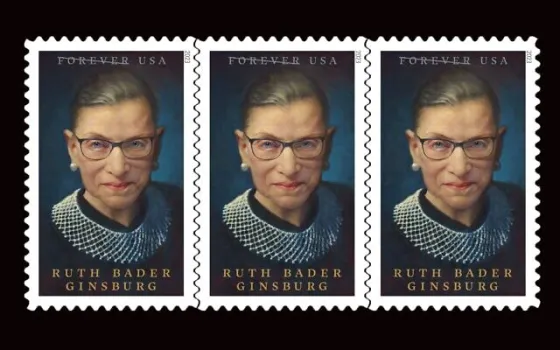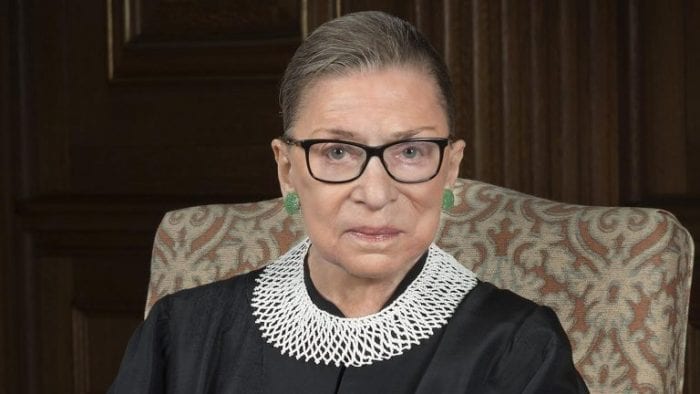The United States Postal Service released a new Forever stamp honoring the late Supreme Court Justice Ruth Bader Ginsburg on Oct. 2. The stamp’s unveiling took place at the Smithsonian’s National Portrait Gallery during a first-day-of-issue dedication ceremony that was open to the public.
Designed by Ethel Kessler, an art director for USPS, with a Michael J. Deas oil painting based on a photograph by Philip Bermingham, the stamp captures the 107th U.S. Supreme Court justice in her black judicial robe and favorite white-lace collar.
 “Justice Ginsburg was an iconic figure who dedicated her life to public service and the pursuit of justice,” said USPS Board of Governors Chairman Roman Martinez IV. “She was a true pioneer, and it is our honor to celebrate her incredible legacy in this way. This stamp serves not just as a tribute but as an inspiration for future generations to uphold the values she fought for.”
“Justice Ginsburg was an iconic figure who dedicated her life to public service and the pursuit of justice,” said USPS Board of Governors Chairman Roman Martinez IV. “She was a true pioneer, and it is our honor to celebrate her incredible legacy in this way. This stamp serves not just as a tribute but as an inspiration for future generations to uphold the values she fought for.”
Joining Martinez for the ceremony were Nina Totenberg, legal affairs correspondent at National Public Radio; Lori Dym, USPS procurement and property law managing counsel; Elizabeth Glazer, founder of the public safety nonprofit Vital City; and Ginsburg’s granddaughter Clara Spera, a lecturer at Harvard Law School and senior associate at WilmerHale.
The Ruth Bader Ginsburg stamp is being issued as a Forever stamp and is available in panes of 20 at select Post Office locations nationwide and at usps.com/shopstamps. Forever stamps will always be equal in value to the current First-Class Mail 1-ounce price.
The stamp will serve as a lasting tribute to the Brooklyn native who has left an indelible impact on American jurisprudence and society at large.
Ginsburg’s multifaceted legacy includes the legal and social changes she helped to bring about; the example she set of tenacity and perseverance in the service of meaningful work; the inspiring passion that she brought to her dissents in defense of principles she held dear; and the countless people — young and old, men and women — who view her as a role model.
About Ruth Bader Ginsburg
Ginsburg was a lifelong trailblazer as a woman in a male-dominated field, a law professor, an expert on anti-discrimination and equal protection law, and a judge who was unafraid to dissent from her colleagues in steadfast defense of her principles.
In a distinguished career that began as an activist lawyer fighting gender discrimination, Ginsburg was a respected jurist whose strong dissents on socially controversial rulings made her an icon of American culture.
President Bill Clinton nominated her to serve as a Supreme Court justice in 1993, and she subsequently earned praise for her pragmatism and willingness to build consensus. After a 2007 decision upholding a federal abortion procedure ban, she took the unusual step of reading her dissent aloud from the bench, a practice she continued with greater frequency during her second decade on the court.
In 2011, she received an honorary law degree from Harvard, which she attended for two of the three years of her legal education. In 2012, she was the subject of a panel discussion at Yale Law School prior to being named the first Gruber Distinguished Lecturer in Women’s Rights. In 2013, an issue of the Harvard Law Review included several warm tributes to her jurisprudence, and she received the Radcliffe Medal from the Radcliffe Institute for Advanced Study at Harvard University in 2015 for her role as a socially transformative figure.
In 2013, a popular blog created by a New York University law student elevated Ginsburg to the status of “Notorious R.B.G.” — a humorous play on the name of late rapper the Notorious B.I.G. — and further enshrined her as an icon of American popular culture. In 2016, Ginsburg and two biographers published “My Own Words,” which became an immediate New York Times bestseller. The 2018 documentary “RBG” brought additional attention to her life and work, and another film released that year, “On the Basis of Sex,” dramatized Ginsburg and her husband arguing her first discrimination case in the 1970s.
Ginsburg was a lifelong fan of opera, and during her time on the bench she came to be seen as one of the country’s foremost promoters of the art form. In 2015 she attended the debut of a one-act operatic comedy that dramatized her friendship with fellow Supreme Court justice and opera lover Antonin Scalia, a conservative with whom she frequently disagreed on legal matters.
During her Supreme Court years, Ginsburg battled cancer several times but always insisted on returning to the bench as quickly as possible after treatments. Even as she became more visibly frail, her determination to stick to her rigorous, much-publicized daily workout routine and her regular, relentless schedule of work earned her ever greater admiration as she demonstrated her endurance and the strength of her commitment to causes she had championed for a lifetime.
Ginsburg died at the age of 87 on Sept. 18, 2020, at her home in Washington, DC, of complications from metastatic pancreatic cancer.
After Ginsburg’s death, she lay in repose for two days at the Supreme Court — outdoors due to COVID-19 restrictions at the time — after which, during a private ceremony, she was the first woman to lie in state in the U.S. Capitol.









